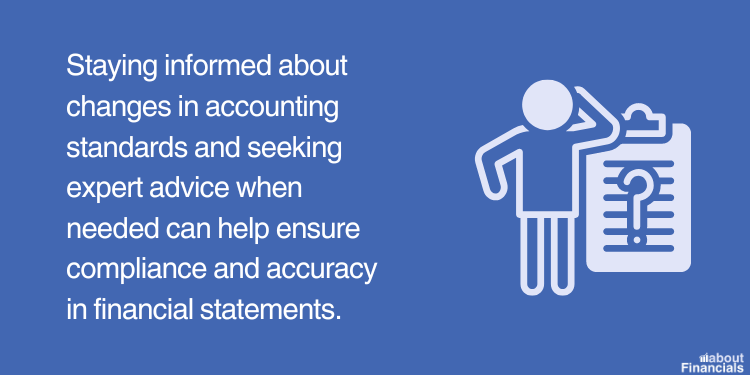Financial statements play a pivotal role in the success and growth of any business. They provide a comprehensive overview of a company’s financial health, performance, and prospects. We will explore why financial statements are important to a business and how they serve as a valuable tool for decision-making and strategic planning.
1. Decision-Making

Financial statements play a critical role in the decision-making process for small business owners. They provide valuable insights into the financial health and performance of the business, enabling informed choices that can drive success and growth. Let’s explore the key ways in which financial statements are essential for decision-making:
2. Assessing financial health and performance
Financial statements, such as the balance sheet, income statement, and cash flow statement, provide a comprehensive view of the company’s financial position. By analyzing these statements, small business owners can evaluate the profitability, liquidity, and solvency of their business.

For instance, the balance sheet helps assess the company’s assets, liabilities, and equity, giving a snapshot of its financial stability. The income statement shows the revenue, expenses, and net income, indicating the business’s profitability. The cash flow statement reveals the cash inflows and outflows, allowing owners to gauge the company’s liquidity.
By understanding the financial health of their business through these statements, owners can make informed decisions about resource allocation, budgeting, and identifying potential financial risks.
3. Identifying areas of improvement
Financial statements enable small business owners to identify areas where improvements can be made to enhance financial performance. By analyzing revenue and expense patterns in the income statement, owners can identify cost-saving opportunities or explore strategies to increase revenue.
Additionally, the balance sheet can highlight areas where efficiency can be improved, such as managing inventory levels or optimizing the utilization of assets. The cash flow statement helps identify potential cash flow bottlenecks or opportunities for better cash management.
By leveraging these insights, owners can implement targeted strategies to enhance profitability, reduce costs, and maximize operational efficiency.
4. Evaluating investment opportunities
Financial statements provide valuable information for evaluating investment opportunities. Whether considering expansion, acquiring new assets, or exploring partnerships, small business owners can use financial statements to assess the feasibility and potential returns of such investments.
By examining the financial data, owners can determine if they have sufficient cash flow or retained earnings to fund investments or if external financing options need to be considered. They can also assess the potential impact of investments on the company’s financial position and evaluate the potential risks and rewards associated with each opportunity.
Financial statements enable owners to make sound investment decisions, ensuring the optimal allocation of resources and minimizing the risks associated with financial investments.
5. Meeting regulatory obligations
Small businesses are subject to various regulatory obligations, including financial reporting requirements imposed by government authorities or industry-specific regulations. Financial statements serve as a means to fulfill these obligations and demonstrate compliance.

By preparing and presenting financial statements in accordance with relevant accounting standards and regulations, small business owners ensure that they meet the necessary reporting timelines and formats. This includes adhering to guidelines such as the Generally Accepted Accounting Principles (GAAP) or International Financial Reporting Standards (IFRS) when applicable.
Meeting regulatory obligations not only helps businesses avoid penalties or legal issues but also showcases their commitment to transparency and accountability, building trust among regulators, investors, and other stakeholders.
6. Filing tax returns accurately
Accurate tax reporting is of utmost importance for small business owners to fulfill their tax obligations and maintain compliance with tax laws. Financial statements provide the foundation for preparing and filing tax returns accurately.
By capturing and organizing financial data in financial statements, small business owners can determine their taxable income, claim eligible deductions, and calculate their tax liabilities. Financial statements, particularly the income statement and balance sheet, provide the necessary information to support the accuracy and completeness of tax filings.
Timely and accurate tax reporting helps businesses avoid penalties, minimize the risk of audits, and maintain a positive relationship with tax authorities. Financial statements play a vital role in ensuring the integrity of tax filings and facilitating smooth interactions with tax authorities.
7. Facilitating audits and financial reviews
Audits and financial reviews are essential processes to assess the accuracy, reliability, and compliance of a business’s financial statements. Financial statements serve as the primary source of information for auditors and reviewers to evaluate a company’s financial position and practices.
External audits, conducted by independent auditors, verify the accuracy of financial statements and provide assurance to stakeholders, such as investors or lenders, regarding the reliability of the reported financial information. Internal financial reviews, on the other hand, assess the effectiveness of internal controls, identify areas of improvement, and ensure compliance with internal policies and procedures.
By maintaining well-prepared financial statements, small business owners facilitate the auditing and review processes. This not only demonstrates a commitment to financial transparency but also provides an opportunity to identify any potential issues, strengthen internal controls, and improve overall financial management.
8. Planning and Forecasting
Financial statements are indispensable tools for small business owners when it comes to planning and forecasting. They provide valuable insights that enable owners to set financial goals, develop budgets and projections, and track progress effectively.
9. Setting financial goals and targets
Financial statements help small business owners set clear financial goals and targets. By analyzing past performance and assessing the current financial position, owners can identify areas for improvement and establish realistic objectives for revenue growth, profitability, and cash flow.

For example, by reviewing the income statement, owners can assess historical revenue trends and determine targets for future periods. The balance sheet enables owners to set goals for optimizing assets, reducing liabilities, and increasing equity. With the help of financial statements, owners can align their financial goals with broader business objectives and create a roadmap for success.
10. Developing budgets and financial Projections
Financial statements serve as a foundation for developing budgets and financial projections. A budget outlines the expected income and expenses for a specific period, providing a roadmap for financial planning and resource allocation.
By analyzing historical financial data from the income statement and balance sheet, owners can make informed projections about future revenue, expenses, and cash flow. These projections help in estimating costs, identifying areas of potential savings, and ensuring adequate financial resources are available to meet business needs.
Financial statements also aid in forecasting cash flow, which is crucial for managing working capital and ensuring the business has enough liquidity to cover expenses and seize opportunities. By leveraging financial statements, owners can create accurate and realistic budgets and projections that form the basis for effective financial planning.
11. Tracking progress and making adjustments
Financial statements play a vital role in tracking progress towards financial goals and making necessary adjustments along the way. By regularly comparing actual financial performance to the projections and budgets outlined in the financial statements, owners can identify any deviations and take corrective actions.
For instance, by reviewing the income statement, owners can assess whether the business is meeting revenue targets and managing expenses effectively. The cash flow statement helps owners monitor cash flow patterns, ensuring sufficient liquidity is maintained. If there are any discrepancies between the actual and projected numbers, owners can investigate the root causes and make adjustments to their strategies or operations.
Financial statements provide owners with real-time visibility into the financial health of their business, enabling them to make informed decisions, reallocate resources, and adapt their plans to changing circumstances.
Challenges with financial statements for small business owners
Small business owners often encounter several challenges when it comes to managing and understanding financial statements. Let’s explore some of these common hurdles and how they can impact businesses:
1. Limited financial literacy

One of the significant challenges faced by small business owners is limited financial literacy.
Not everyone possesses a strong background in accounting or finance, which can make it difficult to comprehend the complexities of financial statements.
Understanding financial statements requires knowledge of accounting principles, terminology, and the ability to interpret the data presented. Without a solid foundation in financial literacy, small business owners may struggle to make informed decisions, identify financial trends, or effectively communicate with stakeholders.
To overcome this challenge, owners can seek assistance from financial professionals or enroll in financial literacy courses to enhance their understanding.
It’s essential to invest time and effort in developing financial acumen to effectively navigate the intricacies of financial statements.
2. Lack of resources
Limited resources, including financial and human capital, can pose challenges for small business owners in preparing and maintaining comprehensive financial statements.
Hiring dedicated accounting staff or investing in sophisticated accounting software may not always be feasible due to budgetary constraints.
Without adequate resources, small business owners may struggle to collect, organize, and analyze financial data in a timely manner. This can result in delayed or inaccurate financial statements, hindering decision-making and financial planning processes.
To address this challenge, owners can explore cost-effective alternatives such as utilizing accounting software or outsourcing certain accounting tasks to professional service providers. Additionally, leveraging technology and automation tools can streamline financial processes, making it more manageable for owners to maintain accurate and up-to-date financial statements.
3. Complex accounting standards
Navigating complex accounting standards can be daunting for small business owners. Accounting rules and regulations, such as GAAP or IFRS, are continuously evolving, requiring owners to stay updated with the latest changes.

Interpreting and applying these accounting standards correctly can be challenging without specialized expertise. Small business owners may struggle to classify transactions, calculate depreciation, or determine the appropriate accounting treatment for certain items.
To overcome this challenge, owners can seek guidance from accounting professionals or consult resources provided by accounting bodies and regulatory authorities. Staying informed about changes in accounting standards and seeking expert advice when needed can help ensure compliance and accuracy in financial statements.
4. Keeping up with changes
Financial statements are not static documents; they need to be regularly updated and revised to reflect changes in the business environment.
Small business owners may find it challenging to keep up with these changes, especially when they are busy managing day-to-day operations.
Business expansions, acquisitions, changes in tax regulations, or economic fluctuations can impact financial statements. Failure to incorporate these changes in a timely manner can result in misleading or outdated financial information, affecting decision-making and stakeholder perceptions.
To address this challenge, small business owners should establish a system for regular financial statement reviews and updates. Designating specific individuals or departments responsible for monitoring changes and ensuring the accuracy and relevance of financial statements is crucial.
Final thoughts
By leveraging the information provided by financial statements, businesses can navigate challenges, seize opportunities, and achieve long-term success. Understanding and utilizing financial statements is a key aspect of effective financial management, and it is essential for businesses to recognize and embrace their importance.
